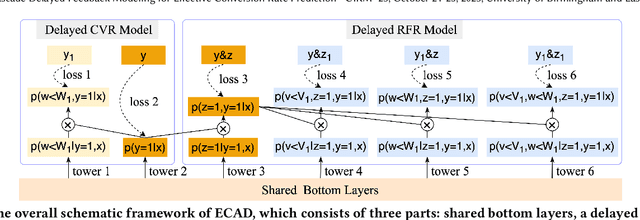Entire Space Cascade Delayed Feedback Modeling for Effective Conversion Rate Prediction
Paper and Code
Aug 09, 2023

Conversion rate (CVR) prediction is an essential task for large-scale e-commerce platforms. However, refund behaviors frequently occur after conversion in online shopping systems, which drives us to pay attention to effective conversion for building healthier shopping services. This paper defines the probability of item purchasing without any subsequent refund as an effective conversion rate (ECVR). A simple paradigm for ECVR prediction is to decompose it into two sub-tasks: CVR prediction and post-conversion refund rate (RFR) prediction. However, RFR prediction suffers from data sparsity (DS) and sample selection bias (SSB) issues, as the refund behaviors are only available after user purchase. Furthermore, there is delayed feedback in both conversion and refund events and they are sequentially dependent, named cascade delayed feedback (CDF), which significantly harms data freshness for model training. Previous studies mainly focus on tackling DS and SSB or delayed feedback for a single event. To jointly tackle these issues in ECVR prediction, we propose an Entire space CAscade Delayed feedback modeling (ECAD) method. Specifically, ECAD deals with DS and SSB by constructing two tasks including CVR prediction and conversion \& refund rate (CVRFR) prediction using the entire space modeling framework. In addition, it carefully schedules auxiliary tasks to leverage both conversion and refund time within data to alleviate CDF. Experimental results on the offline industrial dataset and online A/B testing demonstrate the effectiveness of ECAD. In addition, ECAD has been deployed in one of the recommender systems in Alibaba, contributing to a significant improvement of ECVR.
 Add to Chrome
Add to Chrome Add to Firefox
Add to Firefox Add to Edge
Add to Edge